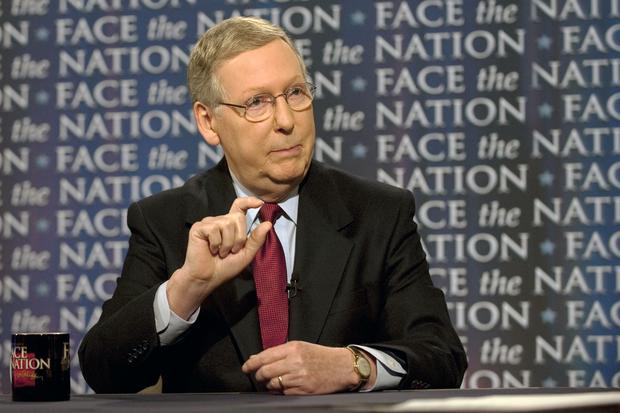GOP Argues Tax Cuts Increase Government Revenue
Republican Senate Minority Whip John Kyl was hammered by Democrats earlier this week for backing extending the Bush tax cuts for the wealthy - and insisting they need not be paid for.
Now Senate Republican Leader Mitch McConnell (pictured) is backing up Kyl's position.
"That's been the majority Republican view for some time," McConnell told TPMDC. "That there's no evidence whatsoever that the Bush tax cuts actually diminished revenue. They increased revenue, because of the vibrancy of these tax cuts in the economy. So I think what Senator Kyl was expressing was the view of virtually every Republican on that subject."
McConnell's argument is that even though the government would be forgoing hundreds of billions of dollars in revenue by extending the tax cuts on relatively wealthy Americans, that loss will be more than offset by the growth spurred by keeping the money in taxpayers' pockets. (The Obama administration wants to extend the cuts for Americans making less than $200,000 or $250,000 but let them lapse for those making more than that.)
Yet as the Washington Post's Ezra Klein and others are pointing out, McConnell's position is largely not supported by budget experts, including President Bush's own Congressional Budget Office. (Here are a number of other experts offering a similar perspective.)
Underlying the debate is an economic concept called the Laffer Curve, which shows that revenue can either increase or decrease when taxes are raised, depending on where the tax rate falls on the curve.
It's not as complicated as it first sounds: The basic idea is that when taxes are raised to a high level - say, for the purposes of this example, 99 percent - revenue will suffer because people will have no incentive to work (and there will thus be nothing to tax). When the tax rate is relatively low, however, raising taxes does indeed generate revenue since incentives to work are still significant.
Liberals have been quick to contrast Republicans' position on the Bush tax cuts for the wealthy with GOP efforts to block an extension of unemployment benefits unless they are paid for. If the Bush tax cuts for the wealthy pay for themselves, they suggest, wouldn't putting money in the pockets of the unemployed have the same effect? (In fact, it could be argued money for the unemployed would have an even more significant effect, since that group would seem to have more need to actually spend the money.)
The GOP's position has the left arguing that despite their ostensible fealty to Tea Party-driven concerns about red ink, conservatives don't really care about the deficit, as Matt Yglesias put it.
He cites as evidence McConnell's position as well as deficit increases under Presidents Ronald Reagan and George W. Bush and opposition from conservatives to a pair of deficit reduction packages in the 1990s.
